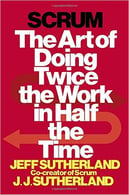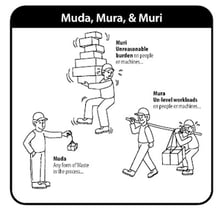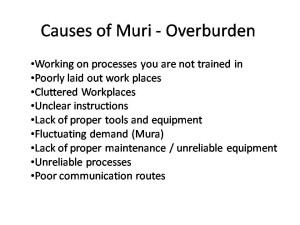A Hero!
It seems so appealing, to be admired, courageous, even to be regarded as a model. Someone to be exemplified!
Except in your business!
 In Scrum: The Art of Doing Twice the Work in Half the Time, Jeff Sutherland shares the existence of heroes in your business is a sign you have significant challenges in your business model.
In Scrum: The Art of Doing Twice the Work in Half the Time, Jeff Sutherland shares the existence of heroes in your business is a sign you have significant challenges in your business model.
A business that depends on regular heroic actions to meet its deadlines or objectives is not working productively.
Think for a minute.
What does it say about your business when someone continually performs heroic acts to bring a project in on time, achieve a sales objective, or get a group or team to perform their jobs properly?
If it happens infrequently maybe your problem isn’t serious. Yet even then the question becomes: What’s wrong with your system when an individual is required to work longer hours, expend more energy, or muster up greater commitment to achieve desired results?
Asks yourself whether this happens in your business? If so how often?
If it is, there’s something fundamentally wrong with how you are doing business.
We shared Taiichi Ohno’s Toyota Production System in Toyota and Scrum Team Characteristics.
 There are three types of waste identified by Taiichi Ohno that lead to people working harder, and for more hours, than necessary. Recognizing these types of waste, which Ohno called Muri, the Japanese word for “Unreasonableness,” is perhaps the most powerful lever for change you can reach.
There are three types of waste identified by Taiichi Ohno that lead to people working harder, and for more hours, than necessary. Recognizing these types of waste, which Ohno called Muri, the Japanese word for “Unreasonableness,” is perhaps the most powerful lever for change you can reach.
- The first type of waste is “Absurdity.” Give your team challenging goals! Push them to reach for more. Don’t have them striving for absurd, impossible goals. If you’re challenged by this idea read our blogs, Stretch Goals – Give Them a Head Start, What Your Business Can Learn From The United Way, or better yet read Aubrey Daniels Bringing Out the Best In People. The value of achieving team goals is in the momentum it creates!
- The second is “Unreasonable Expectations.” Pay attention to this one. It’s exactly why heroics identify a problem in your business. Sutherland notes, How many times have you heard someone brag that through their own heroic efforts they saved a project? Usually this is greeted with backslaps, cheers, and congratulations. I see this as a fundamental flaw in the process. A team that depends on regular heroic actions to make its deadlines is not working the way it’s supposed to work. Constantly moving from one crisis to the next causes burnout, and it doesn’t allow for reasoned, continuous improvement. It’s the difference between a cowboy riding in and rescuing the girl from the bad guys and a disciplined Marine platoon clearing the kill zone.
- The third type of waste Ohno calls “Overburden.” It’s the sort of behavior that Scott Adams regularly lampoons in his Dilbert cartoons. It includes onerous company policies that get in the way, unnecessary reporting that has people filling out forms for the sake of filling out forms, and meaningless meetings that suck up time and don’t deliver any value. Are people in your organization allowed to recommend eliminating these where appropriate? If you have difficulty conjuring up what this means read John Stossel’s: I have lung cancer. My medical care is excellent but the customer service stinks
Ohno didn’t mention a fourth type of waste Sutherland suggests “Emotional Waste.” You may be familiar with this in your business. This type of waste is generated when a company has an asshole in its midst—someone who likes spinning up other people and putting them in a tizzy. Assholes often justify their behavior by claiming they’re simply trying to make people work better. But they’re merely indulging the negative aspects of their personality, and nothing is more undermining of a team’s ability to excel. If you’ve ever worked in an environment like this, especially if this person is your boss, you often wonder what’s happening. This person’s negative behavior severely injuries others. It limits effectiveness and even effort. You often feel like you’re walking on eggshells around this person. If this is someone close to you in a marriage or family it is exhausting.
You may be familiar with this in your business. This type of waste is generated when a company has an asshole in its midst—someone who likes spinning up other people and putting them in a tizzy. Assholes often justify their behavior by claiming they’re simply trying to make people work better. But they’re merely indulging the negative aspects of their personality, and nothing is more undermining of a team’s ability to excel. If you’ve ever worked in an environment like this, especially if this person is your boss, you often wonder what’s happening. This person’s negative behavior severely injuries others. It limits effectiveness and even effort. You often feel like you’re walking on eggshells around this person. If this is someone close to you in a marriage or family it is exhausting.
What can you do about it?
Nothing. Absolutely nothing short of leaving.
For more on this subject read Christine Comaford’s excellent articles: Surrounded By Toxicity At Work? Do This And Soar Above The Conflict, Bullies, Borderline Bosses And Narcissists: How To Survive & Thrive
Bottom Line: Don’t be an asshole—and don’t allow, abet, or accept that behavior in others.
Any “process” that people use is wasteful, and that includes Scrum. What Scrum does is focus us on trying to eliminate the pointless waste that seems part and parcel of work.
Sutherland describes “What you really want in your work is effortless ‘flow.’ In the martial arts or in meditative practice, when you reach a sense of oneness with a motion, it is no longer an effort; it is energy effortlessly flowing through you. When you watch great dancers or singers, you sense that they’re surrendering to a force greater than themselves as they let their art move through them. Reaching that spot in our work is what we should all seek.”
“At the root of flow is discipline.”
That’s why I’ve invested so much time in Scrum. There is a union of thoughts with our Strategic Discipline. There can be no wasted movement—nothing extraneous—just focused application of human capability. Waste is anything that distracts you from that. Focusing your business efforts on your Priorities, Metrics, and Meeting Rhythms generates productivity. If you start thinking about work in terms of discipline and flow, you might just do something amazing.
From this chapter on waste are some excellent, Scrum TAKEAWAYS
Don’t Be Unreasonable. Goals that are challenging are motivators; goals that are impossible are just depressing.
No Heroics. If you need a hero to get things done, you have a problem. Heroic effort should be viewed as a failure of planning.
Enough with the Stupid Policies. Any policy that seems ridiculous likely is. Stupid forms, stupid meetings, stupid approvals, stupid standards are just that—stupid. If your office seems like a Dilbert cartoon, fix it.
No Assholes. Don’t be one, and don’t allow the behavior. Anyone who causes emotional chaos, inspires fear or dread, or demeans or diminishes people needs to be stopped cold.
Strive for Flow. Choose the smoothest, most trouble-free way to get things done. Scrum is about enabling the most flow possible.






.jpeg?width=150&height=135&name=Hand%20with%20marker%20writing%20the%20question%20Whats%20Next_%20(1).jpeg)

